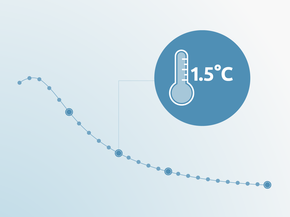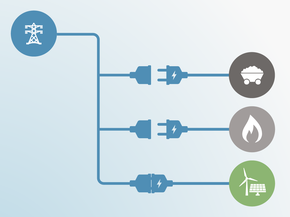Critically Insufficient4°C+
World
NDCs with this rating fall well outside of a country’s “fair share” range and are not at all consistent with holding warming to below 2°C let alone with the Paris Agreement’s stronger 1.5°C limit. If all government NDCs were in this range, warming would exceed 4°C.
Highly insufficient< 4°C
World
NDCs with this rating fall outside of a country’s “fair share” range and are not at all consistent with holding warming to below 2°C let alone with the Paris Agreement’s stronger 1.5°C limit. If all government NDCs were in this range, warming would reach between 3°C and 4°C.
Insufficient< 3°C
World
NDCs with this rating are in the least stringent part of a country’s “fair share” range and not consistent with holding warming below 2°C let alone with the Paris Agreement’s stronger 1.5°C limit. If all government NDCs were in this range, warming would reach over 2°C and up to 3°C.
2°C Compatible< 2°C
World
NDCs with this rating are consistent with the 2009 Copenhagen 2°C goal and therefore fall within a country’s “fair share” range, but are not fully consistent with the Paris Agreement long term temperature goal. If all government NDCs were in this range, warming could be held below, but not well below, 2°C and still be too high to be consistent with the Paris Agreement 1.5°C limit.
1.5°C Paris Agreement Compatible< 1.5°C
World
This rating indicates that a government’s NDCs in the most stringent part of its “fair share” range: it is consistent with the Paris Agreement’s 1.5°C limit.
Role model<< 1.5°C
World
This rating indicates that a government’s NDC is more ambitious than what is considered a “fair” contribution: it is more than consistent with the Paris Agreement’s 1.5°C limit.
Sources
List of references
- Bloomberg. (2015). Germany Proves Life With Less Fossil Fuel Getting Easier. 13 April, 2015. Retrieved September 30, 2016, from http://www.bloomberg.com/news/articles/2015-04-12/germany-proves-life-with-less-fossil-fuel-getting-easier
- BPIE. (2016). Nearly zero-energy buildings. Definitions across Europe. Brussels, Belgium: Buildings Performance Institute Europe.
- Buckley, T., & Nicholas, S. (2017). Japan: Greater Energy Security Through Renewables - Electricity Transformation in a Post-Nuclear Economy. Institute for Energy Economics and Financial Analysis.
- European Parliament. Directive 2010/31/EU of the European Parliament and of the Council of 19 May 2010 on the energy performance of buildings (recast), Pub. L. No. 2010/31/EU (2010). European Union.
- European Parliament. (2010b). DIRECTIVE 2010/31/EU OF THE EUROPEAN PARLIAMENT AND OF THE COUNCIL of 19 May 2010 on the energy performance of buildings (recast).
- Government of Japan. (2010). Note Verbale submitted to the UNFCCC Secretariat. January 26, 2010. The Embassy of Japan, Berlin, Germany.
- Government of Japan. (2015). Japan’s Second Biennial Report under the United Nations Framwork Convention on Climate Change. Government of Japan.
- Government of Japan. (2017). Japan’s Third Biennial Report under the United Nations Framework Convention on Climate Change. Tokyo, Japan: The Government of Japan.
- IEA. (2017a). World Energy Outlook 2017. Paris, France: International Energy Agency.
- IEA. (2017b). World Energy Statistics and Balances. 2017 Edition. Paris, France, France: International Energy Agency.
- JAIF. (2018). NPPs in Japan. Retrieved February 14, 2018, from http://www.jaif.or.jp/en/npps-in-japan/
- Kanden Energy Solution. (2017). Press release (23 March, 2017): Cancellation of the coal-fired power plant construction project in Ichihara, Chiba. In Japanese. Retrieved March 5, 2018, from http://www.kenes.jp/topics/topics032.html
- Kuramochi, T. GHG mitigation in Japan: An overview of the current policy landscape. WRI working paper (2014). Washington DC, USA, and Hayama, Kanagawa, Japan: World Resources Institute and the Institute for Global Environmental Strategies.
- METI. (2014). 2014 Basic Energy Plan. Tokyo, Japan: Agency for Natural Resources and Energy, Ministry of Economy, Trade and Industry.
- METI. (2015). “Enerugii juyou mitooshi ni tsuite” (Document regarding the energy demand outlook). In Japanese. Tokyo, Japan: Document No.2 of the 7th meeting of the subcommittee on the long-term energy demand and supply outlook, Advisory Committee for Energy and Resources. 22 April. Agency for Natural Resources and Energy (ANRE), Ministry of Economy, Trade and Industry.
- METI. (2016). Promulgation of the Partial Revision of the Act on Special Measures Concerning Procurement of Electricity from Renewable Energy Sources by Electricity Utilities. News Release 3 June, 2016. Retrieved September 30, 2016, from http://www.meti.go.jp/english/press/2016/0603_06.html
- METI. (2017a). Karyoku hatsuden ni kakaru sakkon no joukyou (Current circumstances regarding fossil fuel-fired power generation). Material no.4 of the 1st meeting of the working group on fossil fuel-fired power plant standards. 10 October, 2017. In Japanese. Tokyo, Japan: Ministry of Economy, Trade and Industry.
- METI. (2017b). Summary of the Long-term Climate Change Policy Platform. Tokyo, Japan: Ministry of Economy, Trade and Industry, Japan.
- METI. (2018a). 2030 nen enerugii mix jitsugen e muketa taiou ni tsuite - zentai seiri (Actions toward realisation of the 2030 energy mix - an overview. 25th meeting of the Basic Policy Subcommittee. Tokyo, Japan: Advisory Committee for Natural Resources and Energy, Ministry of Economy, Trade and Industry.
- METI. (2018b). Basic policy subcommittee, Advisory Committee for Natural Resources and Energy.
- METI. (2018c). Enerugii tenkan eno initiative an (“Initiative for energy transition: draft”). 10 April, 2018. Expert panel on energy situation. Tokyo, Japan: Advisory Committee for Natural Resources and Energy, Ministry of Economy, Trade and Industry.
- METI, & MOEJ. (2017a). Furonrui no haikiji kaishuuritsu no koujou ni muketa youin bunseki (Decomposition analysis for enhanced F-gas recovery). Document no.5 for the 6th meeting of the METI/MOEJ joint working group on F-gases. 12 September, 2017. In Japanese. Tokyo, Japan: Ministry of Economy, Trade and Industry and Ministry of the Environment, Japan.
- METI, & MOEJ. (2017b). Montreal giteisho Kigali kaisei wo fumaeta kongo no HFC kisei no arikata ni tsuite (an) (Directions on the future regulation of HFCs following the Kigali Amendment of the Montreal Protocol). Document no.2 for the 6th meeting of the METI/MOEJ joint working. Tokyo, Japan: Ministry of Economy, Trade and Industry and Ministry of the Environment, Japan.
- MLIT. (2013). Policy and Programs for Energy Efficient Houses and Buildings. Presentation by Kimihiro Hashimoto, Deputy Director-general, Housing Bureau. February 2013. Tokyo, Japan.
- MLIT. (2016). Overview of the Act on the Improvement of Energy Consumption Performance of Buildings. Tokyo, Japan: Ministry of Land, Infrastructure Transport and Tourism, Japan.
- MLIT. (2017). Juutaku no shouene kijun yuudou kijun eno tekigouritsu ni tsuite (Compliance rates for energy efficiency standards in residential buildings). Document 3-1 of the 2nd research group meeting on the energy performance of buildings. 13. Tokyo, Japan: Ministry of Land, Infrastructure Transport and Tourism, Japan.
- MOEJ. (2012a). “2013 nen ikou no taisaku sesaku ni kansuru houkokusho (Heisei 24 nen 6 gatsu). chikyuu ondankataisaku no sentakushi no gen-an ni tsuite” (Report on the global warming countermeasures beyond 2013. Proposal of options. June 2012). In Japanese. (Vol. 2013). Global Environment Committee, Central Environment Council, Ministry of the Environment, Japan.
- MOEJ. (2012b). Projections of non-energy GHGs. Material No.2 of the 14th meeting of the formulation of the post-2013 mitigation target, Global Environment Committee, Central Environment Council. 28 March, in Japanese. Tokyo, Japan: Ministry of the Environment, Japan.
- MOEJ. (2014). Japan’s National Greenhouse Gas Emissions in Fiscal Year 2012 (Final Figures). Retrieved from http://www.env.go.jp/en/headline/file_view.php?serial=571&hou_id=2077
- MOEJ. (2016). Overview of the Plan for Global Warming Countermeasures,Cabinet decision on May 13, 2016. Ministry of the Environment, Japan.
- MOEJ. (2017a). Greening of Whole Tax System and Carbon Tax in Japan. January, 2017. Tokyo, Japan: Environment and Economy Division, Ministry of the Environment, Japan.
- MOEJ. (2017b). Outline of Long-term Low-carbon Vision. Tokyo, Japan: Ministry of the Environment, Japan.
- MOEJ. (2018). Submission of the opinion by the Minister of the Environment on the environmental impact assessment draft report on the Misumi no.2 power plant. In Japanese. Retrieved March 5, 2018, from https://www.env.go.jp/press/104893.html
- MOEJ, & METI. (2014). Mitigation measures for F-gases. In Japanese. Material No.4 of the 2nd meeting of the MOE/METI joint advisory council working group on the INDC formulation. Tokyo, Japan: Ministry of Economy, Trade and Industry (METI) and Ministry of the Environment, Japan (MOEJ).
- Nikkei. (2017). Keisansho dengenkousei kokkaku kaezu (Minister of METI: "no change on electricity mix). 2 August, 2017. Retrieved February 20, 2018, from https://www.nikkei.com/article/DGKKASFS01H46_01082017EE8000/
- Oi, M., Ito, F., & Tanimoto, M. (2017). Current status and challenges of environment impact assessment for coal-fired power plants. In 16th annual meeting of Japan Society for Impact Assessment (pp. 1–5). Kofu, Yamanashi, Japan.
- Renewable Energy Institute. (2017a). Annual Statistics in Japan. Retrieved February 19, 2018, from http://www.renewable-ei.org/en/statistics/annual.php
- Renewable Energy Institute. (2017b). Biomass co-firing: For the reduction of coal-fired power plants. 3 October, 2017. Retrieved February 18, 2018, from https://www.renewable-ei.org/en/column/column_20171003.php
- UNFCCC. (2017a). UNFCCC: National Inventory Submissions 2017. Retrieved from http://unfccc.int/national_reports/annex_i_ghg_inventories/national_inventories_submissions/items/10116.php
- UNFCCC. (2017b). UNFCCC AWG-KP Submissions 2017. Common Reporting Format. Bonn, Germany: United Nations Framework Convention on Climate Change.
Further analysis
Latest publications
Stay informed
Subscribe to our newsletter






